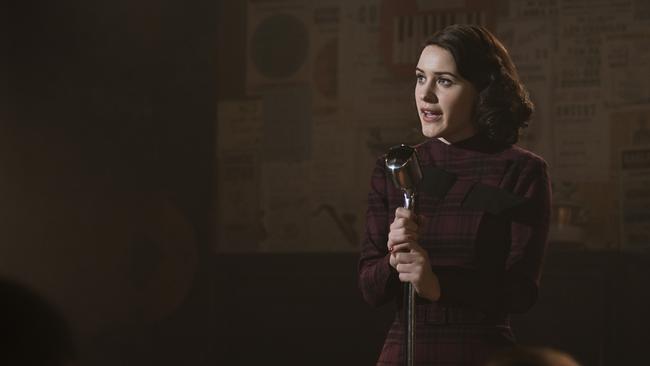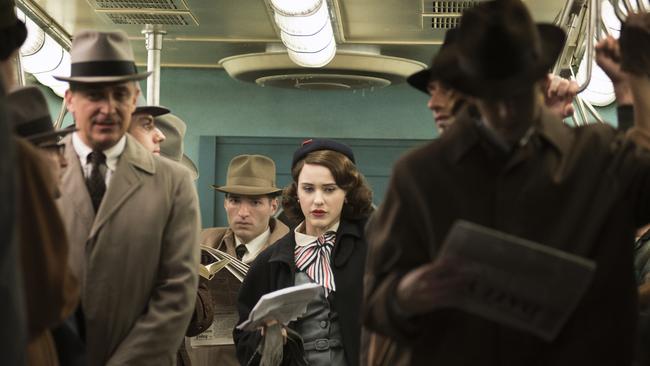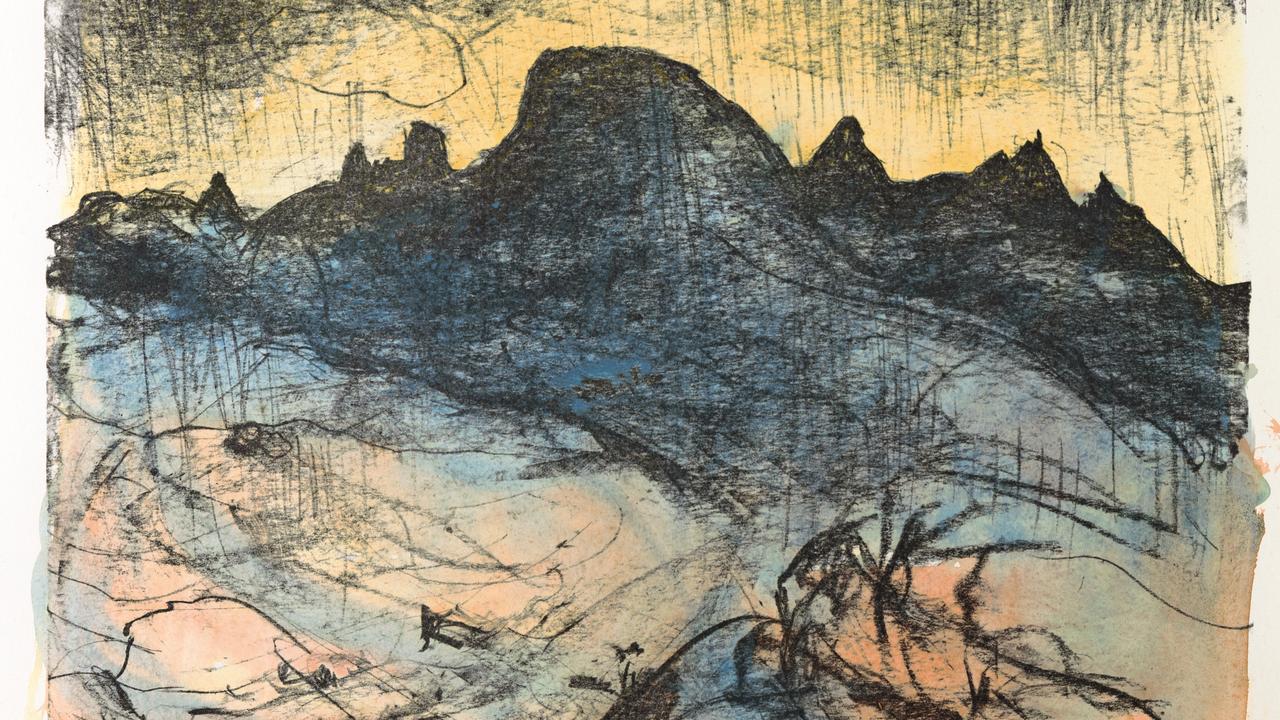The Marvelous Mrs. Maisel sees Rachel Brosnahan shine
When Rachel Brosnahan auditioned for The Marvelous Mrs. Maisel she was wracked with illness but she pushed through.

Stop me if you’ve heard it before: the one about the actress who gets the worst flu of her life. She is also about to do the most important stand-up comedy act of her career. She must deliver five minutes of material, at midday, to an almost empty room. The stakes are high but simple: make ’em laugh, and get everything.
But, and this is important: she is not a comedian. She doesn’t write punch lines. She is really more of a self-professed “dad joke” aficionado: she laughs at farts, at dopey puns in store names. She has never played a club; never even played a living room. And there she is, sloshing around in her heels, most likely contagious, telling jokes to four people who could change her fate.
There is no punch line here: this really happened. When Rachel Brosnahan, who is 27 and not a comic but now plays one on Amazon Prime, walked into her audition for The Marvelous Mrs Maisel, she could barely see straight. She was, as she told me, “probably deathly ill”, but she had no intention of cancelling.
For one thing, she had already pushed back her flight once, hoping her illness would abate. Instead, her temperature spiked. The morning of her rescheduled trip, she woke up clammy and disoriented and completely terrified that if she didn’t hurl her body out to Hollywood that day, then Amy Sherman-Palladino and her co-creator (and husband) Daniel Palladino were going to give the part of Midge Maisel away to the next woman. She couldn’t let that happen.
“I flew my ass out to Los Angeles when I probably should not have even been on a plane,” she says. But she had a feeling in her bones that Midge was her part. In a world of hamburger roles for television ingenues, Midge was a porterhouse. Sherman-Palladino writes her leading ladies — Lorelai of Gilmore Girls, Michelle Simms on Bunheads — as walking winks, verbose descendants of Dorothy Parker, quipping for their lives.
Brosnahan felt she could truly inhabit Miriam (Midge) Maisel, a young Jewish housewife in 1958 who has everything: the gleaming Upper West Side apartment, the doting husband who pitches ad copy by day and wears transgressive turtlenecks by night, a toddler and a bouncing baby, and a waist that cinches to a Coke-bottle shape in a Perma-lift girdle. (Never mind that Brosnahan is a gentile.)
By the end of the first episode, of course, Midge’s idyll crumbles. First, she finds out that her husband, Joel, who spends his nights workshopping comedy sets at the Greenwich Village club the Gaslight Cafe, has been stealing his material from Bob Newhart records. Emasculated, Joel continues to dig: he tells Midge he’s sleeping with his svelte secretary, Penny Pann, and worse, they’re in love, and he’s packing his bags.
After he slinks away, Midge downs a bottle of red wine on the subway, marches through the rain to the famed Gaslight Club and winds up onstage, soaking and soused in a pink swing coat. What follows is not so much a comedy set as an act of absurdist outsider art; Midge mocks men coming out of the bathroom, skulks around the stage like a Valkyrie and veers between pathos and one-liners so wildly that the crowd isn’t sure whether to laugh or flee.
For a grand finale, her top comes off, the cops are called and she’s hauled off to jail screaming about how “there’s no [expletive] way that Penny Pann can compete with these tits!”
This meltdown is one of the scenes that Brosnahan had to play during that audition. Her illness, it turns out, worked in her favour. She looked damp and deranged the entire time.
“It was a mess,” she says. “And Amy kept stopping me to tell me to powder my face. I think I may have had a small stroke. I literally don’t remember a single moment of it.”
Sherman-Palladino later tells me she has a different memory of Brosnahan’s audition. “She blew in like a hurricane. Nothing shook. Her pages didn’t shake, her hands didn’t shake. There was literally no fear.” Daniel Palladino adds that, while they knew making actresses perform a stand-up set to a cold room was “sadistic”, they had to find someone who could wisecrack under pressure.
Brosnahan has been an actress on the cusp for a decade — always just about to break out, about to be the chosen one. It’s not that she hasn’t been noticed. When she was 21 and about to graduate from New York University, she was cast in House of Cards as Rachel Posner, a high-end escort in Washington who sleeps with a congressman and then is paid off to stay quiet.
The role was originally intended for someone older and Brosnahan was supposed to act in only two episodes, but her chemistry with Michael Kelly, who played the presidential chief of staff assigned to handle Posner and who falls for her in the process, was so undeniable that the creators wrote her role into eight episodes in the second season, and one more episode, in the third, that earned her an Emmy nomination.
Her House of Cards character met a brutal end — buried somewhere in the wilderness for knowing too much — but by then Brosnahan already had another TV job. She played Abby Isaacs, the young wife of a physicist, in the underrated period drama Manhattan, about the creation of the atomic bomb. All red lipstick, pin curls and wifely duties, Abby was a hint at what Brosnahan could do with a part like Midge: another woman who loses her innocence, in this case a newcomer to Los Alamos who slowly comes to understand her husband might help blow up the world.
Brosnahan was born in Milwaukee but raised in Highland Park, Illinois, outside Chicago. Her father worked in children’s publishing, and her mother, an import from Britain, stayed home to raise Brosnahan and her two siblings.

She went to NYU to study drama but began booking roles so quickly — guest spots on In Treatment, The Good Wife and CSI: Miami, parts in indie films — that she had to have “many dinners” with her father just to assure him that she was attending enough classes to graduate.
Until Midge, Brosnahan had played almost solely dramatic roles. That’s where she feels most comfortable, most in control; as she has discovered, telling jokes involves a level of vulnerability far beyond crying on camera. Luckily, the women who Sherman-Palladino and Palladino write are all about taut sentences and tight timing; there is nothing elastic. Their loose, swingy tempo is all pre-planned. (“A monstrous amount of material, and you have to have it down cold,” Brosnahan says).
While this rigour may not have worked for a seasoned comedian, someone accustomed to improvisation, Brosnahan took to the constraints right away. She found the bounce inside Midge’s hardness; she snaps the end of her sentences like bubblegum.
Sherman-Palladino’s father Don Sherman was a comic right out of the borsch-belt old school. After he died in 2012, she began to think about how she might honour his legacy by telling stories about his world — Lenny Bruce would come by the house when she was a child, and though her family lived in Los Angeles by then, she grew up hearing war stories about the New York stand-up scene.
She began to think about setting something in the world her father rattled around in, the dank Village clubs of the 1960s. But instead of following a grizzled comic through the haze of two-drink minimums and chance encounters with The Tonight Show host Jack Paar, she decided to showcase a much less examined life: that of a normal woman, alone under the hot lights, slinging zingers for pay.
It is this belief in Midge’s normalcy — that she was just like every other wife putting dinner on the table — that ultimately makes her a radical character for TV right now.
Her comedy doesn’t come from a deep well of insecurity; it comes from a brazen moxie that she cannot explain and never realised had a viable outlet until she stepped onstage.
At this turbulent moment in show business, when many men — especially comics — who were praised and protected as icons are being revealed as harassers, creeps and criminals, what we thought of as a linear narrative of progress is being rewritten. We are seeing how many talented women were forced to diminish themselves or give up in the face of misogyny, particularly in comedy, where being a successful woman is so often tied to making the boys in power laugh.
The Marvelous Mrs Maisel has a swirling, magical-realism quality to it. It begins with a wedding — Midge and Joel’s — at which, naturally, Midge insists on giving her own toast.
She is a woman who has enjoyed every privilege: couture clothes, the full spread at the fish counter at gourmet emporium Zabar’s, a palatial apartment in her parents’ building.
One striking scene from the pilot follows Midge as she does her nightly beauty routine, waking up twice in the middle of the night, once to remove her make-up and again to put it back on, so her husband always wakes up to a perfectly done face. When Joel leaves her the shock is seismic. She has never had to work, or even struggle with her own self-image. This is why her revelations are so primed for comedy: she is a woman who fully believed she deserved the moon, and when her perfect facade disappears, she’s apoplectic and confused and ready to rant.
Whenever Midge’s jokes really hit, it is joyful and electric to watch. Women have the right to claim, and reclaim, a place in stand-up comedy history. There were always women working the circuit. The Marvelous Mrs Maisel provides a vehicle through which to engage and recover their stories all over again.
“What I love about Midge is that she is so not a feminist,” Brosnahan tells me. “She’s a creature of her time.” Midge Maisel is doing what she needs to do to get ahead in a man’s world, which is its own kind of quiet, lesser-told revolt. “What she is,” Brosnahan continues, “is curious. She’s insatiable. If she doesn’t know things, she wants to know them. And she doesn’t know any other way than forward.”
The Maisel set sits on a cavernous soundstage at Steiner Studios, in the Brooklyn Navy Yard. I watch Brosnahan film a domestic scene from the seventh episode, in which she and her pert platinum friend, Imogene, played by Bailey De Young, are stuffing goodie bags for a children’s birthday party inside her parents’ posh apartment.
There are dozens of period-appropriate trinkets — Tiny Tina baby carriages, Silly Putty, Bazooka Joe — and the women must place them into each bag in a precise order, all while firing off rapid, breathless dialogue. It is the final shot of the night.
“Wait, there’s already gum in here,” Brosnahan, as Midge, says, her forehead crinkling.
“I put it in there,” De Young says, playing Imogene slightly ditzy.
“I’m doing gum.”
“I thought you were doing candy cigarettes.”
“Starting over,” Brosnahan sighs, dumping the gift bags with a loud clatter on to the table.
With each take, the two sped up the lines, hands flying. Speak, sigh, pour, speak, sigh, pour, faster and faster. Brosnahan pounces on her lines like a whizzing metronome. Midge is the kind of woman who sets a blistering tempo and waits for the rest of the world to catch up.
The Marvelous Mrs Maisel is streaming on Amazon Prime Video.


